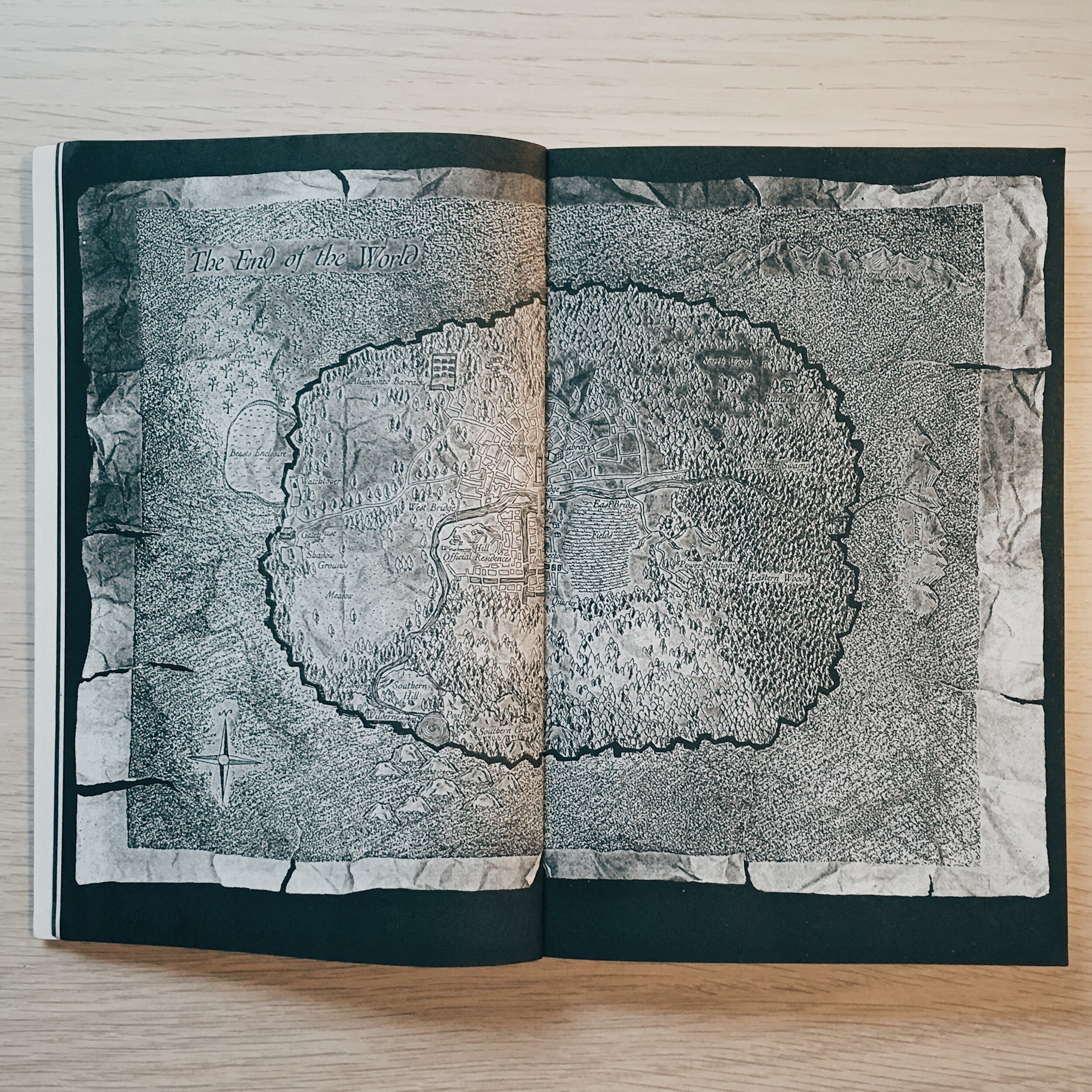Hard-Boiled Wonderland and the End of the World by Haruki Murakami
The Book in Three Sentences
In this complex pairing of intertwined stories, Murakami takes us to another world as he examines what it means to live a meaningful life. Scattered with intentional ambiguities, the book operates in contrasts — ordinary/sublime, conscious/subconscious, perfect/imperfect — nothing is ever equal. You could choose to live an unexamined life, content and oblivious, but the delight of this book is investigating each metaphor and pausing to reflect.
Notes
There are several key characters in this book that are without names: the Gatekeeper, the Caretaker, the Librarian(s), and the Colonel. Murakami’s response to this was (translated):
“I'm not sure myself, and can only say that I was embarrassed about naming people. I'm not sure how to put it, but it seemed somewhat artificial for someone like me to be freely designating names onto people, even if they were fictional characters I created. The first time I was able to properly name characters was in Norwegian Wood (1987). So, in the first eight years before that, I was using nameless characters and writing in the first-person view. Thinking about it, it seems I was limiting myself with a tedious rule, but I didn't give it a second thought then.”
The book operates on contrasts and oppositions:
ordinary vs extraordinary
conscious vs subconscious
left brain vs right brain (shuffling data; a cracked egg of a brain—see page 32)
perfect vs imperfect
mortal (messy but meaningful life) vs immortal (content, oblivious, eternal meaningless life)
Hard-Boiled Wonderland vs End of the World
Favourite quotes
“Nobody has a shadow in this town, and anybody we let in never leaves. Your question is meaningless,” said the Gatekeeper. So that’s how I lost my shadow. (p64)
I stopped to take a last look at my scrap heap of an apartment. Once again, life had a lesson to teach me: It takes years to build up; it takes moments to destroy. Sure I’d gotten tired of this tiny space, but I’d had a good home here. In the time it takes to swill two cans of beer, all had sublimed like morning mist. My job, my whiskey, my peace and quiet, my solitude, my Somerset Maugham and John Ford collections—all trashed and worthless. The splendour of the fields, the glory of the flowers, I recited under my breath. Then I reached up and pulled the breaker switch to cut the electricity. (p187)
* Note: this seems to reference William Wordsworth’s “Ode on Intimations of Immortality from Recollections of Early Childhood” which depicts a nostalgic sense of childhood clarity that you grow out of as you get older. Grass — or “fields” in this translation — is usually thought of as ordinary, but you can recover the sense of importance in ordinary things and see splendid fields.
“We walk at an easy pace, hardly speaking, not for the lack of things to say but because there is no need. We view the scenery: snowy contours hollowed into the land, birds with beaks full of berries, plantings think with winter vegetation, small crystal-clear pools in the river course, the distant snowcapped ridges. Each sight bursts upon us.” (p276)
I can tell Bob Dylan in an instant. His voice is like a kid standing at the window watching the rain. (p345)
The River
“That’s the way it is with the mind. Nothing is ever equal. Like a river, as it flows, the course changes with the terrain.” (p226)
* Note: This is a statement inside the town world, turns out to be an important piece of the overall story. It reveals a lot about the physical construction of the town.
Sound and Memory
At times my mind grows heavy and dark; at other times it soars high and sees forever. By the sound of this tiny accordion, my mind is transported great distances. (p367)
I call up different images of the Town behind closed eyes. Here are the willows on the sandbar, the Watchtower by the Wall in the west, the small tilled plot behind the PowerStation. The old men sitting in the patch of sun in front of my quarters, the beasts crouching in the pooled waters of the River, summer grasses blowing in the breeze on the stone steps of the canal. I remember visiting the Pool in the south with the Librarian. I view the Abandoned Barracks near the North Wall, the ruins of the house and well near the Wall in the Woods. I think of all the people I have met here. The Colonel next door, the old men of the official Residences, the Caretaker of the Power Station, the Gatekeeper—each now in his own room, no doubt, listening to the blizzard outside. Each place and person I shall lose forever; each face and feature I shall remember the rest of my life. If this world is wrong if its inhabitants have no mind, whose fault is that? I feel almost a… love… toward the Town. I cannot stay in this place, yet I do not want to lose it. (p367)
The Sea as a Metaphor for Life
“I was born by the sea,” I said. “I'd go to the beach the morning after a typhoon and find all sorts of things that the waves had tossed up. There'd be bottles and wooden geta and hats and cases for glasses, tables and chairs, things from nowhere near the water. I like combing through the stuff, so I was always waiting for the next typhoon.”
I put out my cigarette.
“The strange thing is, everything washed up from the sea was purified. Useless junk, but absolutely clean. There wasn't a dirty thing. The sea is special in that way. When I look back over my life so far, I see all that junk on the beach. It's how my life has always been. Gathering up the junk, sorting through it, and then casting it off somewhere else. All for no purpose, leaving it to wash away again.”
“This was in your home town?” she askes.
"This is all my life. I merely go from one beach to another. Sure I remember the things that happen in between, but that's all. I never tie them together. They're so many things, clean but useless.” (p375)
It just so happens that the way the brain fits together appears the same as a cracked egg.
Explanation of the Town by the Shadow
warning: Spoilers Past Here
“Fine, let me tell you. People's minds are transported outside the Wall by the beasts. That is what I meant by skimming off. The beasts wander around absorbing traces of mind, then ferry them to the outside world. When winter comes, they die with a residue of self inside them. What kills them is not the cold and not the lack of food; what kills them is the weight of self forced upon them by the Town. In spring, new young are born — exactly the same number as the beasts that died — and it happens all over again. This is the price of your perfection. A perfection that forces everything upon the weak and powerless.”
I cannot say a thing. I look down at my shoes.
“When the beasts die, the Gatekeeper cuts off their heads," my shadow goes on, unrelenting. "By then, their skulls are indelibly etched with self. These skulls are scraped and buried for a full year in the ground to leech away their energy, then taken to the Library stacks, where they sit until the Dreamreader's hands release the last glimmers of mind into the air. That's what 'old dreams' are. Dream reading is a task for newcomers to the Town—people whose shadows have not yet died. The Dreamreader reads each spark of self into the air, where it diffuses and dissipates. You are a lightning rod; your task is to ground. Do you see?”
“I believe I do.”
“When the Dreamreader's shadow dies, he ceases to be Dreamreader and becomes one with the Town. This is how it's possible for the Town to maintain its perfection. All imperfections are forced upon the imperfect, so the 'perfect' can live content and oblivious. Is that the way it should be? Did you ever think to look at things from the viewpoint of the Beasts and Shadows and Woodsfolk?” (pp335–336)
A nice two-page spread: Map of the End of the World.
The Realization that the Two Worlds Will Collide
In Hard Boiled Wonderland, the main character finally states out loud, “Well, it's like this. Deep in your consciousness, there's this core that is imperceptible to yourself. In my case, the core is a town. A town with a river flowing through it and a high brick wall surrounding it. None of the people in the town can leave. Only unicorns can go in and out. The unicorns absorb the egos of the Townpeople like blotter paper and carry them outside the wall. So the people in the town have no ego, no self. I live in the town—or so the story goes. I don't know any more than that since I haven't actually seen any of this with my own eyes.”
"Well, it's certainly original, I'll say that.” [says the reference desk girlfriend]
River? The old man hadn't said anything about a river.
“But it's none of my creation, at least not that I'm aware of," I said.
"It's still yours, isn't it? Nobody else made it,” she says. (p359)
* Note: the river is one of the keys to this connection.



